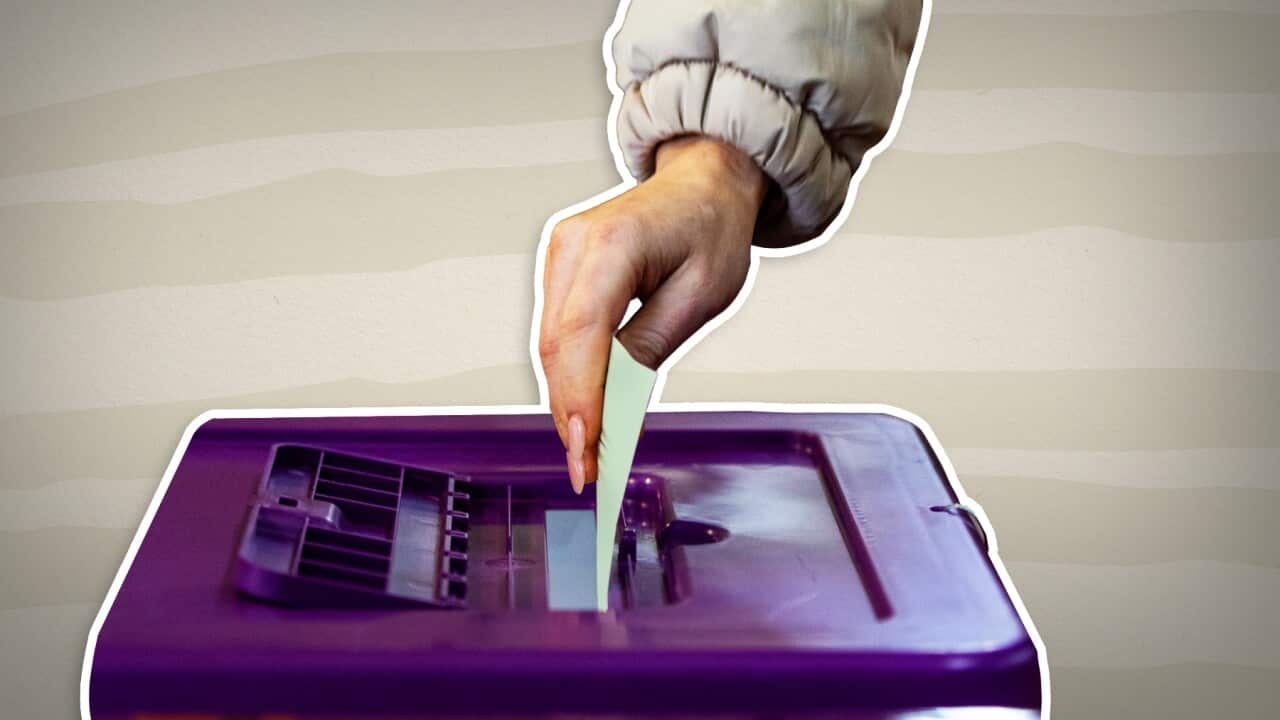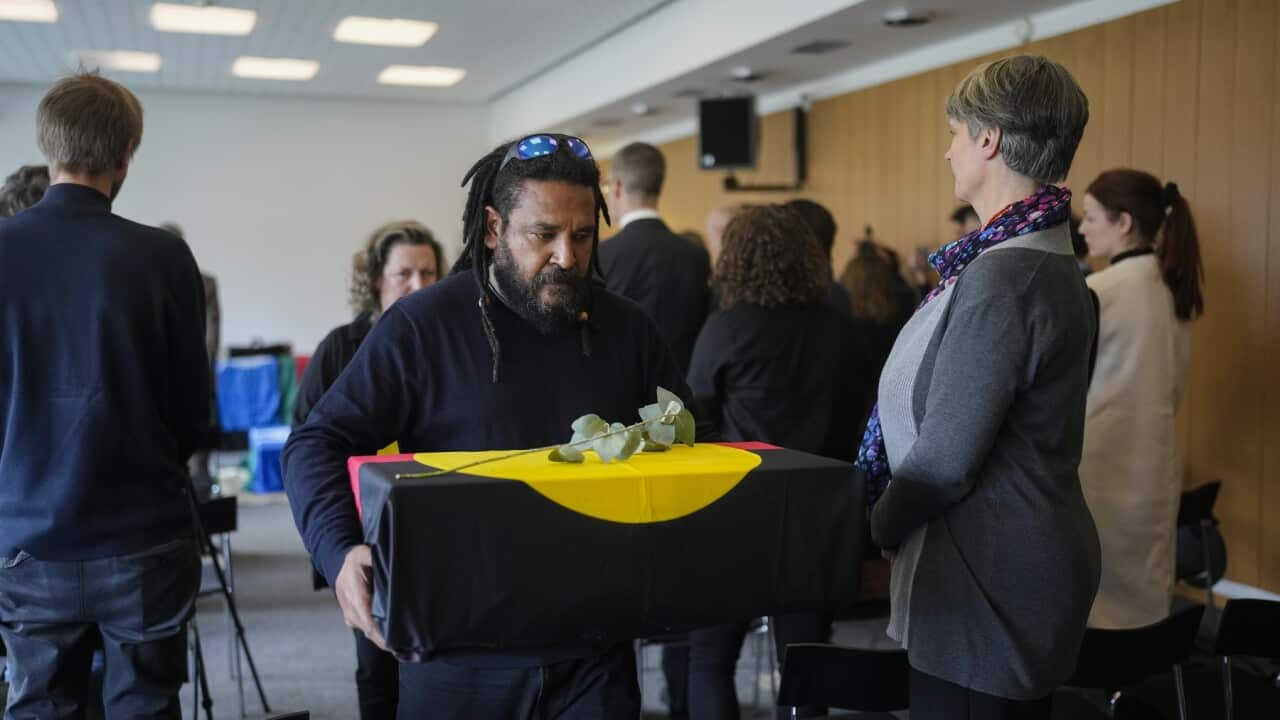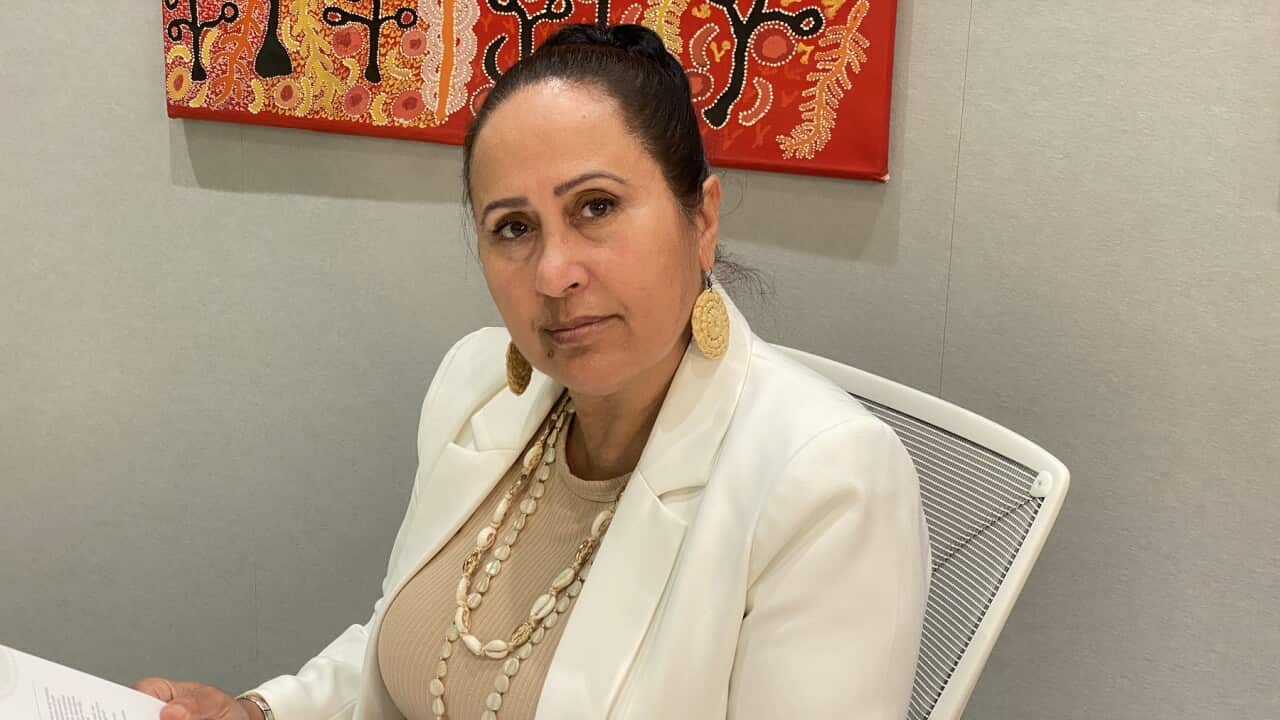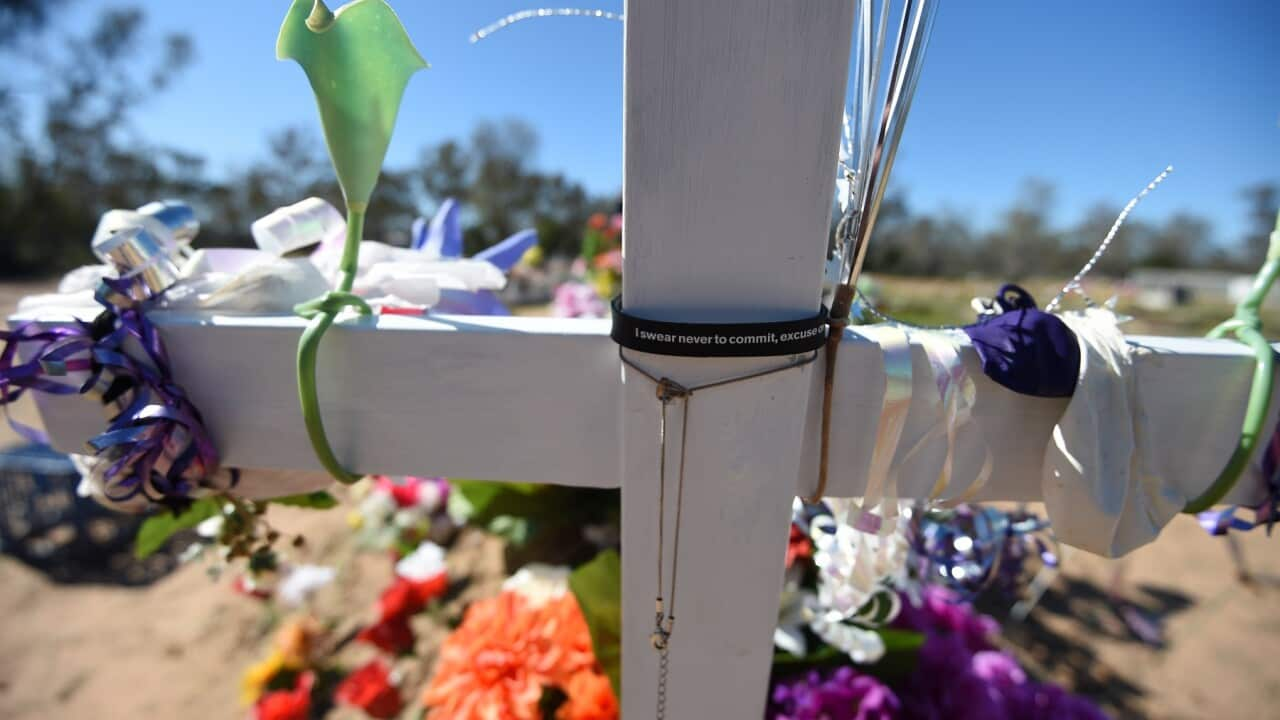Stay informed on the 2023 Indigenous Voice to Parliament referendum from across the SBS Network, including First Nations perspectives through NITV. Visit the to access articles, videos and podcasts in over 60 languages, or stream the latest news and analysis, docos and entertainment for free, at the .
TRANSCRIPT
With just over a week until Australians vote in the Indigenous Voice to Parliament referendum many people, including those from migrant backgrounds, are yet to make up their minds.
Early voting has begun but Australians will officially go to the ballot box on October 14th.
Pre-polling conducted by Resolve Strategic on behalf of Nine Newspapers suggests 18 per cent of non-Anglo voters are still undecided.
The Sydney Alliance is a coalition of more than 40 civil society organisations, including religious, union and community groups.
Its co-lead organiser is Chantelle Ogilvie-Ellis. She says a big part of the indecision among migrant communities comes from a lack of assurance about the information they're receiving.
“Whether that's on social media, or things passed on to them by others, or even things they read in the media, they're not exactly sure where that information is coming from and whether to trust it.”
This lack of trust has helped play into the spread of misinformation on social media, whether that by be bots, trolls, neo-Nazis or fake accounts.
Social media apps like Tik Tok have been awash with content about the Voice - with both the official Yes and No campaigns using the platform to appeal to voters. It's also played a large role in the No campaign's slogan of, 'If You Don't Know, Vote No.'
And it's a message leading No campaigner and Opposition Leader Peter Dutton is seeking to capitalise on.
“The problem is, that for people like Anthony Albanese and Linda Burney, they haven't been able to deliver for Indigenous Australians and they've embarked our country on a path to division. You've got families arguing against each other, you've got communities arguing against each other. The Prime Minister was told on numerous occasions not to take the country down this path, but he made a deliberate decision to do so. And he should be man enough to stand up and take responsibility for the mistakes he's made.”
Meanwhile, Prime Minister Anthony Albanese says he's seen a full suite of misinformation surrounding the Voice.
“The idea that the Voice will have a say on the Reserve Bank determination on interest rates, is quite frankly, absurd. And they know that's the case. But there is worse information in some social media as well, about the world conspiracies, that the United Nations will control all land in Australia. All land. You will lose private ownership of everyone's home will go, with the Yes vote. It's just absurd.”
A recent poll by Essential Research found the No stance currently leads 49 per cent to 43 per cent for a Yes vote, narrowing from a previous 51 per cent No and 41 per cent Yes.
Dr Shireen Morris teaches constitutional law at Macquarie University and is a former federal Labor party candidate. She says it's important not to over-complicate the issue.
“It's a Yes/No question. Do we say Yes to recognising Indigenous peoples in the constitution, from which they were previously excluded, through giving them an advisory Voice in laws and policies made about them. So, just the ability of Indigenous communities to give advice when government and parliament make decisions impacting their communities. That's all this is ... And it's really, really important to get the factual and accurate information out there, that this is just about recognition, through an advisory voice.”
The Sydney Alliances's Chantelle Ogilvie-Ellis is among those seeking to correct the spread of misinformation among multicultural communities. She says a key part of this is working with local leaders to start conversations about the Voice.
“What we find is a lot of people are reaching out to the people that they already trust and asking them for advice. Because they take their responsibility really seriously. They want to do the right thing. I've heard people say, 'I want so much to do the right thing but I don't know what to do.' on the 14th of October. So they're going to, you know, maybe it's their pastor or their Imam (one who leads Muslim worshippers in prayer) or just a friend that they trust or someone they really respect in their community and asking for advice. So we've really been encouraging leaders to take up that opportunity and get informed themselves and speak to their own communities, and give them some guidance, while always allowing people to make their own choices about the Voice.”
Another element in combating misinformation among migrant communities is the use of translated materials.
Eva Hussein is a former refugee and the director of growth and relationships at Polaron, a language services provider offering in-language materials on the Voice. She says her team quickly came to realise multicultural communities in Australia had very little information.
“So, with an organisation called Life Without Barriers who have funded the project, we translated a number of accessible resources, so that's videos, social media tiles and fact-sheets into 53 different languages. That includes AUSLAN and Aboriginal languages as well.”
The English source text was developed in collaboration with Aboriginal communities.
Keen to get the quality of the translations right, Ms Hussein says their team had four translators working on each language group, and more than 250 people working on the project altogether. She says their resources have since been read, listened to and watched by thousands of people in multicultural communities.
“We wanted to make sure that these messages are quick to market, whereas the official government translations are longer. And, we perhaps felt that people just don't have time to read long messages, so we went for short and sharp and accessible.”
While it's one thing to produce these materials, Ms Hussein says it's a whole other undertaking to ensure these messages reach the right communities.
“We know that many communities that are new arrivals to Australia may have other things on their minds. So that includes (laughs) working and living and bringing up kids... So we engaged community leaders to record messages. And we've trusted community leaders that were able to explain to their communities in their own language, why it ... And look, at the end of the day, people have to make up their own minds.... But I think having community leaders behind it, and also organisations like, Ethnic Communities Council Victoria, and FECCA, which is the Federation of Ethnic Communities of Australia really helped, because they disseminated these messages.”
More-than-180 ethnic and cultural community organisations have signed up a joint resolution supporting the Yes campaign. Among them is the Ethnic Communities Council of Victoria, which over the past three months, has been engaging with multicultural communities about the referendum to share information in-language.
Mo Elrafihi is the chief executive officer of the E-C-C-V and says it's been well-received.
“Whether it's members of the Chinese community, Greek, Jewish, Muslim or across the board, many members of our multicultural community are engaging with the referendum. Having community ambassadors go out to multicultural communities and talking about the importance of recognition in partnership with First Nations people. So we've held community forums, we've shared information on our social media and many organisations have translated information about the referendum in-language.”
Jimmy Li is the President of the Chinese Community Council of Australia's Victoria Chapter. He says while there is plenty of information about the Voice available in Chinese online, he's also noticed plenty of translated misinformation.
“We have been trying to combat this kind of misinformation through forums and through discussions on social media. We appeal to people as you can see on our website, we appeal to people to read the referendum question itself. Three points. Very simple question. And also to read those views, opinions, by experts, legal experts, lawyers, judges, and scholars. Of course, we noticed that some people don't read those daily. They just read those on social media. So that has been frustrating, to some extent. But we are doing our best.”
In these instances, Dr Shireen Morris says it's important for communities to step up and take ownership of where they are getting their information from.
“Don't wait for the Yes campaign to do it. This referendum requires every single one of us to stand up as Australians and be counted. So go to voice.gov.au go, to multiculturalforvoice.org to get the information. It's available in many different languages. And this is a very simple proposition, yes or no to recognising Indigenous peoples by giving them an advisory voice. So let's be part of this unifying moment and be part of the conversation.”













